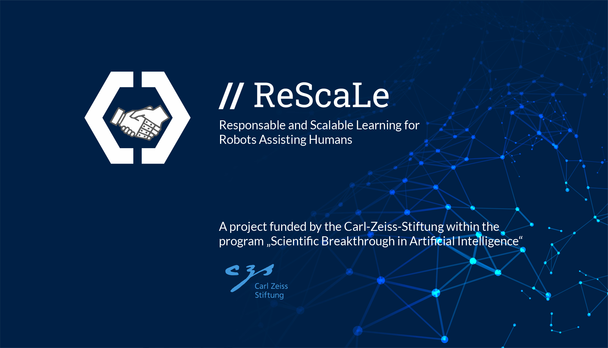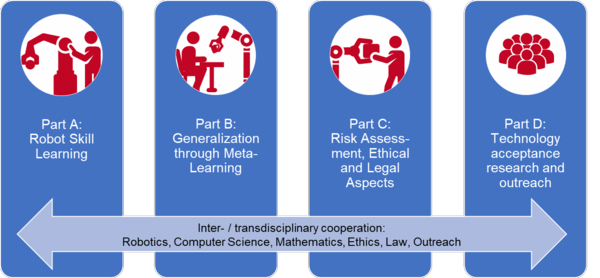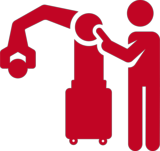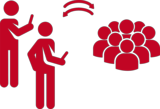 Responsible and Scalable Learning for Robots Assisting Humans
Responsible and Scalable Learning for Robots Assisting Humans
AI-based robots are expected to support numerous tasks in our society, for example by assisting people in everyday life or making production processes more efficient - however, despite rapid advances in research, they are not yet part of our everyday lives. In order to make them more integrable for everyday life, ReScaLe will on the one hand work on the still existing technical challenges in the field of machine learning. On the other hand, the project will also consider social, ethical and legal aspects in order to strengthen trust in these systems.
Robots to learn tasks from humans by being demonstrated to them
Innovative machine learning methods will enable ReScaLe robots to learn tasks from humans by demonstrating them to them. To enable robots to efficiently perform the learning task, ReScaLe is developing new approaches to minimize the number of demonstrations required. The research project will introduce novel unsupervised and self-supervised deep learning methods that require only a small amount of annotated data. Further innovative methods will also support deep learning in dealing with uncertainties to further improve data efficiency.ReScaLe will simultaneously pave the way for responsible AI and robotics applications based on human rights, taking an integrated multi-level approach that considers ethical-legal normative requirements in conjunction with risks to core rights and interests, as well as user*oriented design requirements. Specially tailored participatory outreach activities accompany the project to promote community acceptance and enable bidirectional communication with researchers.
Researchers from the fields of computer science, ethics, human-machine interaction, law, mathematics and robotics are participating in ReScaLe. The project strengthens the profile field "Data Analysis and Artificial Intelligence" of the University of Freiburg and will be located in the research building 'Intelligent Machine-Brain Interfacing Technology' (IMBIT).


Part A: Methods for robot skill learning in human-centered environments through imitation and reinforcement learning
In this part of the project, we will investigate robot skill acquisition through imitation and reinforcement learning in human-centered environments. The robot used in this context consists of a mobile base with a height-adjustable arm. It is further equipped with multiple RGB-D cameras to perceive the environment. We will set up a real-world kitchen environment in which the developed learning methods will be evaluated on tasks such as setting a table, tidying up, or sorting groceries into cupboards. Hence, the required robot skills will range from simple pick-and-place actions to more complex trajectory-dependent actions such as opening cabinets or handing over objects.

Part B: Generalization of skills across different tasks and environments using meta-learning techniques
In this part of ReScaLe, we will set up multiple additional distinct kitchen environments to develop and evaluate transfer learning techniques. Among these different households, the robot tasks will be similar but have to be carried out with different objects, different contexts, and different goals. We will set up multiple identical robot platforms, such as the one described in Part A, that will learn and train skills in parallel in the different environments while sharing their experience.

Part C: Assessment of uncertainty in learned models, risk management, and ethical and legal basis and implications
In this part of the ReScaLe project, we lay the foundations for risk-sensitive and safe human-robot interaction by improving uncertainty estimates of deep learning models. We will quantify properly what these models do not know, especially in the context of sequential decision-making problems, which are relevant for all of the learning procedures considered within ReScaLe. These improved uncertainty estimates will provide improved risk management approaches and permit procedures to govern the interaction of AI-driven robots with humans. Towards this end, we will analyze legal and ethical requirements for a responsible research and innovation approach to develop AI-based robotics systems, and generate empirical data through participatory ethics research with different stakeholder groups; eventually, we will integrate the findings into a multi-level framework for responsible AI and robotics that can serve as a blueprint for legally and ethically aligned research in this field.

Part D: Technology acceptance research and outreach
This part of the ReScaLe project will facilitate a mutual transfer of knowledge between scientific and non-scientific actors. In this part, (preliminary) results of the ongoing research process of all WPs converge and are disseminated to society in innovative formats of public outreach and knowledge transfer. The aim is to foster highly open-minded and sincere discussions between researchers and the public on the societal and ethical implications of assistive AI systems and to provide approaches of reverse communication from society to academia. The participatory exchange will provide the basis for developing a novel model of technology acceptance related to human-robot interactions.
